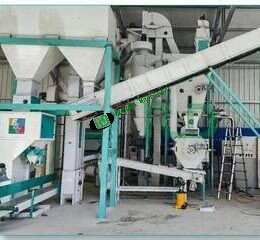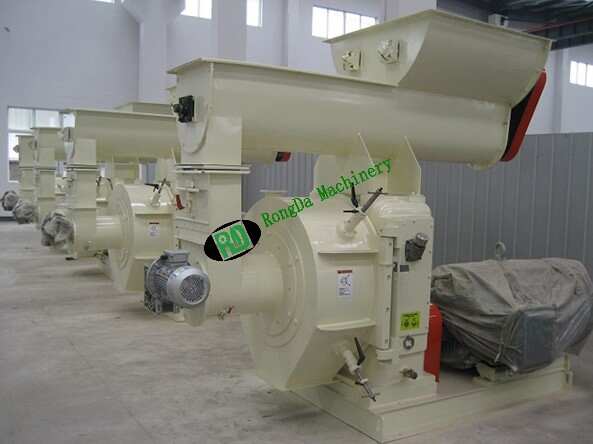Welcome to Rongda Machinery Co., Ltd
Toggle Navigation
The global energy landscape is undergoing a remarkable transformation as nations and industries pivot toward renewable alternatives. Among the frontrunners in this green revolution, biomass pellets have carved out a significant niche as a viable replacement for conventional fossil fuels. These compact energy sources, crafted from compressed organic waste materials including timber residues, crop leftovers, and various plant matter, represent a breakthrough in sustainable fuel technology. This comprehensive analysis delves into the multifaceted advantages, diverse applications, and accelerating market adoption of biomass pellets, highlighting their pivotal role in reshaping our energy future.

Biomass pellets are engineered fuel units created through the compression of organic waste materials such as wood shavings, agricultural byproducts, straw, grain husks, and various plant-derived substances. The manufacturing process involves several critical stages: initial material preparation through grinding, moisture elimination via industrial drying, and final compression into standardized cylindrical forms. This sophisticated production method yields a concentrated energy source that offers superior storage capabilities, enhanced transportability, and versatile applications spanning from residential heating to large-scale power generation and livestock nutrition.
The appeal of these pellets extends across both domestic and commercial sectors, driven by their renewable characteristics and demonstrated ability to substantially decrease carbon emissions compared to traditional energy sources.
The environmental credentials of biomass pellets stand as their most compelling feature. Unlike fossil fuel combustion, which introduces additional carbon into the atmosphere, biomass pellets maintain carbon equilibrium. The carbon dioxide emissions produced during burning approximately match the quantity previously absorbed by source plants during photosynthesis. This balanced carbon exchange creates a sustainable energy cycle that actively supports climate change mitigation efforts.
Furthermore, biomass pellet manufacturing transforms organic waste streams that would typically end up in landfills, creating a circular economy approach that minimizes environmental waste while generating valuable energy resources.
Biomass pellets demonstrate exceptional energy density characteristics, delivering significantly higher heat output per unit compared to conventional biomass forms like loose wood chips or traditional logs. Their standardized dimensions and consistent composition ensure predictable combustion patterns, resulting in stable and optimized energy generation.
Modern pellet-burning appliances are specifically engineered to maximize fuel efficiency while minimizing harmful emissions. This technological synergy produces outstanding thermal performance with reduced environmental impact, making pellets an excellent choice for various heating and power applications.
Biomass pellets offer compelling financial benefits as fossil fuel prices experience ongoing volatility. These renewable energy sources provide more predictable cost structures and can often be sourced from local suppliers, reducing transportation expenses while strengthening regional economies.
In areas with abundant biomass resources, pellet production costs remain relatively modest, making them an attractive option for consumers seeking to reduce energy expenditures while investing in sustainable technologies.
The versatility of biomass pellets enables their use across multiple sectors:
Residential Applications: Homeowners increasingly choose pellet heating systems as superior alternatives to conventional heating methods. These systems deliver consistent warmth with reduced environmental impact compared to petroleum-based heating solutions.
Electricity Generation: Large-scale power facilities utilize biomass pellets for electricity production. Numerous utilities have successfully transitioned from coal to biomass pellets, significantly reducing their environmental footprint while meeting regulatory requirements.
Industrial Processes: Manufacturing sectors, agricultural operations, and food processing facilities employ biomass pellets for process heating, product drying, and cooking applications. Their reliable combustion characteristics make them ideal for operations requiring consistent high-temperature output.
International governments are implementing comprehensive incentive programs to promote renewable energy adoption, including biomass utilization. These initiatives aim to reduce fossil fuel dependency, minimize greenhouse gas emissions, and enhance energy independence. Such supportive regulatory environments encourage both commercial and residential users to embrace biomass pellets as practical energy solutions.
European nations have established aggressive renewable energy benchmarks, with countries like Denmark and Germany leading biomass adoption efforts. North American markets are experiencing rapid growth, particularly in regions with abundant raw material access.
Growing climate awareness drives consumers and businesses toward carbon-reduction strategies. Biomass pellets address this demand by providing genuinely sustainable energy alternatives. Their carbon-neutral properties and emission reduction capabilities appeal to environmentally conscious users seeking practical ways to minimize their ecological impact.
Continuous technological improvements in pellet manufacturing and combustion systems contribute to market expansion. Contemporary production facilities achieve higher efficiency rates while reducing manufacturing costs. Simultaneously, advanced heating appliances ensure optimal pellet utilization, maximizing heat output while minimizing waste generation.
Abundant availability of suitable feedstock materials, including forestry residues and agricultural waste products, supports continued market growth. Many regions generate surplus biomass materials, creating ideal conditions for cost-effective pellet production. This resource abundance reduces manufacturing expenses while alleviating pressure on natural forest ecosystems.
The biomass pellet industry demonstrates strong growth potential across residential and commercial markets. Ongoing technological developments will enhance production efficiency while expanding the range of suitable feedstock materials. Increasingly stringent environmental regulations will likely accelerate demand for clean, renewable energy solutions like biomass pellets.
Organizations and individuals considering renewable energy investments should evaluate the comprehensive benefits of biomass pellets, including environmental advantages, operational efficiency, and application flexibility. Integrating biomass pellets into energy strategies can simultaneously reduce environmental impact and achieve long-term cost savings.

Biomass pellets represent a transformative approach to meeting global energy requirements sustainably. Their applications across heating, power generation, and industrial processes offer cleaner, more efficient alternatives to fossil fuel dependence. With rising environmental awareness, supportive policy frameworks, and continued technological advancement, biomass pellet demand is positioned for sustained growth.
For stakeholders committed to renewable energy adoption and carbon footprint reduction, biomass pellets provide a practical pathway toward a more sustainable energy future. Choosing biomass pellets means investing in both energy efficiency and environmental stewardship, contributing to a cleaner planet for coming generations. The advantages are substantial, and market demand for this renewable energy source continues its upward trajectory.